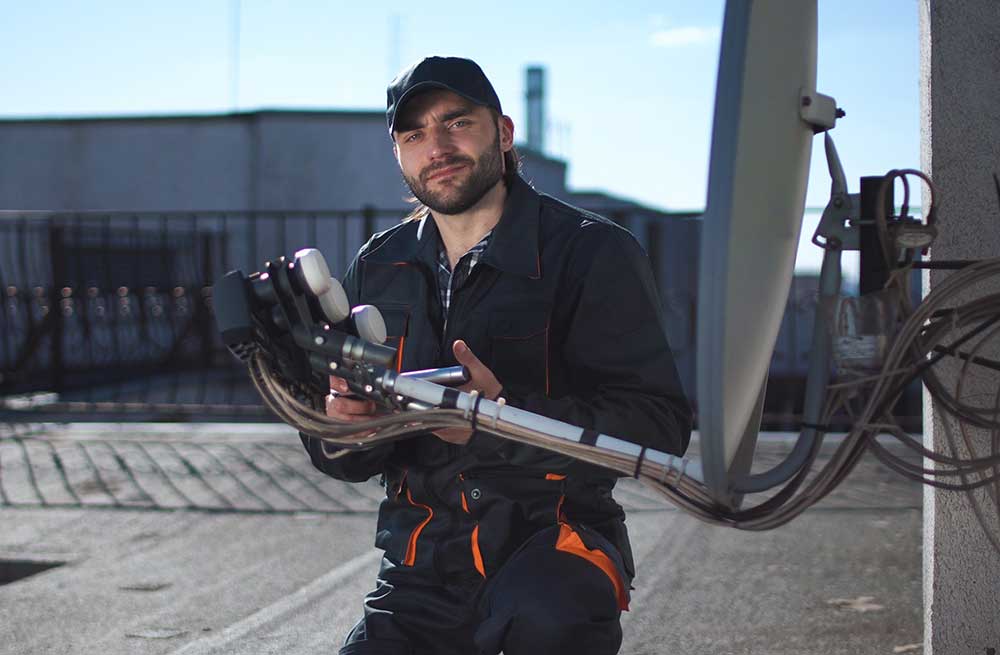Disclaimer: The information on our website is provided for general information purposes only. We make no representations or warranties of any kind, express or implied, about the completeness, accuracy, reliability, suitability or availability with respect to the website or the information contained on our website for any purpose. Any reliance on such information is therefore strictly at your own risk and we are not liable for any damages or losses arising out of or resulting from your reliance on any information contained on our website.
A broadcast technician sets up equipment that controls video clarity, signal strength, and audio quality. They also operate equipment to stream live events or record video. Along with set-up, they are also responsible for tearing down the equipment and maintaining it when not in use. Watch a video to learn what a broadcast technician does.
How to Become a Broadcast Technician

A minimum of a high school diploma is required to be a broadcast technician; however, most have some training. If you are interested in becoming a broadcast technician, attending vocational school allows hands-on education that can take several months to a year to complete. However, earning a certification shows employers that you know industry standards and are current with new technologies. According to O*NET OnLine, over 25% of the broadcast technicians surveyed held a post-secondary certification while almost 35% had a bachelors degree or higher. A little over 20% stated they only held a high school diploma or equivalent.
Coursework and training in math, computers, science, video production management or editing, or a related field are commonly sought after when seeking to become a broadcast technician. In addition to the coursework- internships, entry-level positions, or volunteering at a community organization that offers practical hands-on experience with equipment can be beneficial.
Though not required, seeking certifications can also be helpful. There are several offered through the Society of Broadcast Engineers (SBE). These certifications can make you more competitive when applying for employment by demonstrating knowledge or mastery in industry-standards for broadcast technicians.
In addition to formal training, you must also have excellent problem-solving and technical skills, stamina due to physical demands, communication and listening abilities, and technology and computer software skills.
It may be wise to get your first job as a broadcast technician in a smaller market or station to gain experience. You can advance in your career and earn higher pay by transferring to a larger station that values experience after learning the trade more. Eventually, those with leadership and extensive experience can become a chief broadcast engineer; however, these positions may require a bachelor’s degree in engineering.
Job Description of a Broadcast Technician
A broadcast technician’s duties may vary according to the size of the station they work at and may change from day to day. Broadcast technicians primary functions are operating, monitoring, and adjusting video, audio, lighting, and broadcast equipment. They set up and take down broadcasting equipment for events and performances. Broadcast technicians operate transmitters both in studios and on location in the field. They record music, speech, or other sounds on computers or recording equipment often using sophisticated software, in addition to synchronizing sounds and dialogue with action happening in a movie or television production.
Broadcast technicians generally work full time, but schedules may include additional hours for live events or to keep up with production schedules. Radio and TV stations are typically on the air 24/7, so technicians’ hours may run around the clock. You should expect a variety of day, night, weekend, and early morning shifts. You could work in a studio or outside, pending on where you are needed. This job can be physically demanding, having to carry, set up, and manage equipment throughout the day. Often you are also sitting at a computer. There is constant activity and demands; therefore, you must work well under pressure and be good a time management.
Benefits of being a Broadcast Technician
Broadcast technicians find satisfaction in the hands-on aspects of their job, taking pride when broadcasts run smoothly thanks to their expertise with video and equipment. They value their role in delivering news to the public, deriving job satisfaction from their essential contributions. Staying updated with evolving technology allows them to continually learn and apply new skills. Many enjoy the opportunity to travel to different locations with their crews, breaking the routine of indoor and outdoor work. With full-time employment, they benefit from a stable income. Social interactions vary, allowing them to work collaboratively or focus on equipment tasks. While larger stations may offer more benefits, standard perks like healthcare, sick and vacation days, and sometimes retirement plans are typically available across the industry.
Resources
For resources, check out the Learning About Video and Broadcasting online class offered through the Southwest Museum of Engineering, Communications, and Computation. Also, the Association of Performing Arts and Entertainment Professionals offers an ESET’s program teaching essential skills for entertainment technicians.
Broadcast Technician Career Video Transcript
While the stars of popular media may get a lot of the recognition, their appearances are made possible —and optimized— by the work of broadcast and sound engineering technicians. They operate the electrical equipment for radio programs, television broadcasts, concerts, sound recordings, and movies. Audio and video equipment technicians handle equipment such as video screens, video monitors, microphones, and mixing boards. They record meetings, sports events, concerts, and conferences.
Broadcast technicians set up and operate equipment that regulates the clarity, signal strength, sound, and color of the broadcasts. They use software to edit audio and video recordings. Sound engineering technicians run equipment that records and mixes music, voices, and sound effects. They work in recording studios, performance venues, and film and stage productions. Audio and video technicians typically work in studios, although some work on location for events or to broadcast news. They also set up systems in schools, hospitals, homes, or other locations.
Technicians generally work full time, but schedules may include additional hours for live events or to keep up with production schedules. Radio and TV stations are typically on the air 24/7, so technicians’ hours may run around the clock. Broadcast technicians generally need an associate’s degree, while audio and video equipment technicians, and sound engineering technicians typically need a certificate or related training.
Article Citations
- Bureau of Labor Statistics, U.S. Department of Labor, Occupational Outlook Handbook, Broadcast and Sound Engineering Technicians.
- National Center for O*NET Development. 27-4012.00. O*NET OnLine.
- The career video is in the public domain from the U. S. Department of Labor, Employment and Training Administration.

